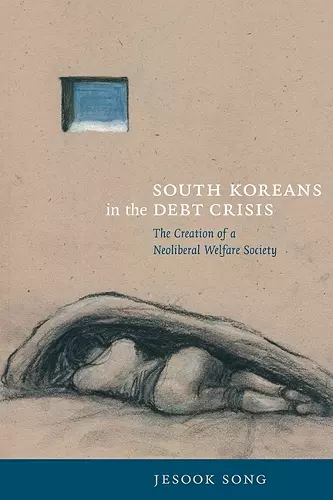South Koreans in the Debt Crisis
The Creation of a Neoliberal Welfare Society
Format:Hardback
Publisher:Duke University Press
Published:18th Aug '09
Currently unavailable, and unfortunately no date known when it will be back

Examines the rise of neoliberal social welfare policy in South Korea during the period of the Asian Debt Crisis
Examines the logic underlying the neoliberal welfare state that South Korea created in response to the devastating Asian Debt Crisis (1997-2001).South Koreans in the Debt Crisis is a detailed examination of the logic underlying the neoliberal welfare state that South Korea created in response to the devastating Asian Debt Crisis (1997–2001). Jesook Song argues that while the government proclaimed that it would guarantee all South Koreans a minimum standard of living, it prioritized assisting those citizens perceived as embodying the neoliberal ideals of employability, flexibility, and self-sufficiency. Song demonstrates that the government was not alone in drawing distinctions between the “deserving” and the “undeserving” poor. Progressive intellectuals, activists, and organizations also participated in the neoliberal reform project. Song traces the circulation of neoliberal concepts throughout South Korean society, among government officials, the media, intellectuals, NGO members, and educated underemployed people working in public works programs. She analyzes the embrace of partnerships between NGOs and the government, the frequent invocation of a pervasive decline in family values, the resurrection of conservative gender norms and practices, and the promotion of entrepreneurship as the key to survival.
Drawing on her experience during the crisis as an employee in a public works program in Seoul, Song provides an ethnographic assessment of the efforts of the state and civilians to regulate social insecurity, instability, and inequality through assistance programs. She focuses specifically on efforts to help two populations deemed worthy of state subsidies: the “IMF homeless,” people temporarily homeless but considered employable, and the “new intellectuals,” young adults who had become professionally redundant during the crisis but had the high-tech skills necessary to lead a transformed post-crisis South Korea.
“Song’s contribution is significant in two important ways: first, Song’s treatment of neoliberalism is both concrete and complex. . . . Second, Song was not just an ethnographer but an active participant in the process of defining and understanding homelessness to inform social policy.” - Laura C. Nelson, Journal of Asian Studies
“[M]eticulously researched book. . . . This work makes a significant contribution to our understanding of the transformative nature of the social ethos and political/economic outlook that contemporary South Koreans hold in the context of the formation of the neoliberal welfare state. The book is filled with sharp theoretical insights and sophisticated explanations. . . . Overall, this is an exemplary book that rigorously pursues the theoretical implications of neoliberal social arrangements and offers compelling information through the accompanying rich empirical field notes, interviews and creative sources. . . . The book should be required reading for scholars and students who are interested in contemporary South Korea, neoliberalism, governmentality, gender politics and social movements.” - Hyaeweol Choi, Acta Koreana
“Song’s succinct prose makes complex political and economic issues accessible to those unfamiliar with the issue or the region. At the same time, the treatment of the issues is complex enough to be of interest to those who seek to deepen their understanding of the subject. . . .” - Sheena Nahm, American Anthropologist
“[Song’s] ethnographic and sharply critical perspective from within the eye of the storm reads fresh, even at this remove. This book may itself become a signpost for the kind of witnessing that future anthropologists of South Korean society will be challenged to write.” - Laurel Kendall, American Ethnologist
“South Koreans in the Debt Crisis is a very powerful analysis of the specific forms that neoliberalism has taken in a late-industrializing East Asian society, not just in the government’s actions but in individuals’ and activist-intellectuals’ self-conceptions. There is very little that explores in such depth how neoliberal logics work in East Asian countries where well established liberal societies did not exist prior to neoliberal reform.”—Ann Anagnost, author of National Past-Times: Narrative, Representation, and Power in Modern China
“This is the first book in English on a very important topic: how South Korea became a neoliberal state during the period when the ‘IMF Crisis’ affected the whole society. Jesook Song shows how neoliberalism as a governing technology works in everyday life. Not only the government but also the mass media and progressive intellectuals were involved in the construction of the categories of ‘deserving’ and ‘undeserving’ welfare recipients.”—Seung-kyung Kim, author of Class Struggle or Family Struggle? The Lives of Women Factory Workers in South Korea
“[M]eticulously researched book. . . . This work makes a significant contribution to our understanding of the transformative nature of the social ethos and political/economic outlook that contemporary South Koreans hold in the context of the formation of the neoliberal welfare state. The book is filled with sharp theoretical insights and sophisticated explanations. . . . Overall, this is an exemplary book that rigorously pursues the theoretical implications of neoliberal social arrangements and offers compelling information through the accompanying rich empirical field notes, interviews and creative sources. . . . The book should be required reading for scholars and students who are interested in contemporary South Korea, neoliberalism, governmentality, gender politics and social movements.” -- Hyaeweol Choi * Acta Koreana *
“[Song’s] ethnographic and sharply critical perspective from within the eye of the storm reads fresh, even at this remove. This book may itself become a signpost for the kind of witnessing that future anthropologists of South Korean society will be challenged to write.” -- Laurel Kendall * American Ethnologist *
“Song’s contribution is significant in two important ways: first, Song’s treatment of neoliberalism is both concrete and complex. . . . Second, Song was not just an ethnographer but an active participant in the process of defining and understanding homelessness to inform social policy.” -- Laura C. Nelson * Journal of Asian Studies *
ISBN: 9780822344643
Dimensions: unknown
Weight: 472g
232 pages